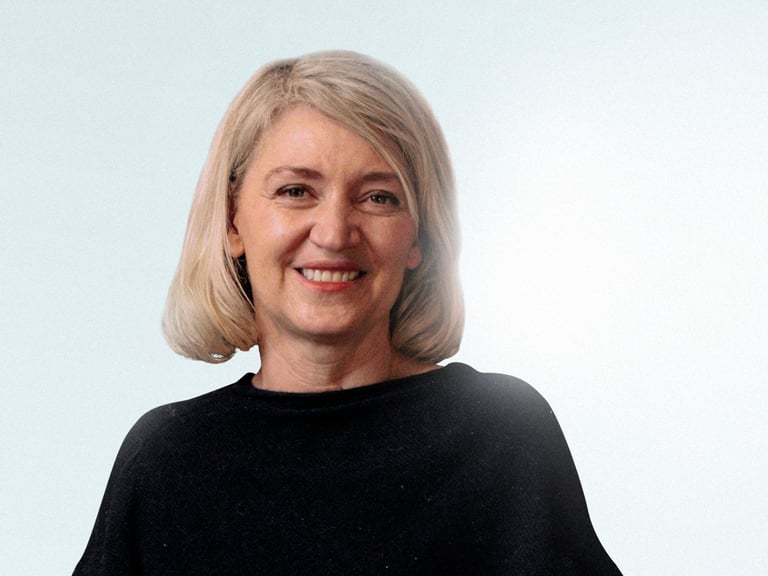Defying all the odds

By Cape Capital
24.10.2023

After a life-altering accident, Sarah de Lagarde has emerged as a resilient advocate for both technological innovation and personal growth.
So often we associate the possibility of danger with thrill-seeking activities – motor racing, skydiving, cliff jumping – but for London-based Global Head of Communications at Janus Henderson, Sarah de Lagarde, it was a much more mundane incident that altered her life forever. ‘After working late on a rainy Friday evening last September, I made the split-second decision to take the tube,’ she recalls. ‘I slipped through the gap between the platform and the train, and fell backwards into the darkness. As the train departed, it ran me over and crushed my arm. I called for help for 15 minutes but nobody heard; then a second train pulled into the station and crushed me again, this time claiming my leg.’

In part, she puts her survival in that moment – and the ability to adapt to life as a double amputee afterwards – down to being able to apply her work-place approach to change. ‘I’ve been a communications manager for almost 20 years and my day-to-day is dealing with change,’ explains Sarah, who has two children and only a month before the accident climbed Kilimanjaro with her husband. ‘Most people don’t like change; we’re hardwired to control our environment and make it as risk-free as possible but I have a different mindset. The advice I give the C Suite is that you can’t stop change from happening but in a work situation, the way to manage it is to prepare and put a structure in place in order not to panic. Lying in that tunnel, my first thought was, ‘do not panic’. I slowed my heartbeat, just like when I was at the top of the mountain, took deep breaths, and assessed my options.’
After such a trauma, it typically takes around two years before someone returns to work: Sarah’s determination to rebel against the norm meant she was back in the office after four months. ‘I had a big drive to return to my job and to look after my children but at the same time, a near-death experience makes you question what’s important. Instead of caring about getting wrinkles or criticising our bodies, we need to look after them so that they actually work,’ she says. ‘I don't see myself as a victim; I see myself as a warrior. Every day when I wake up, I have the choice to look down the abyss at the darkness there, the despair and disappointment and sense of ‘why me?’, but I don’t go down that route. It’s not going to help me or my family.’
In the immediate aftermath of the accident, her husband did some research and quickly realised that although the NHS would provide a prosthetic arm, it wasn’t going to be cutting-edge. He set up a GoFundMe page, raising the £250,000 needed for the hardware and care in a Buckinghamshire private clinic, in just 19 days. ‘I thought my husband was crazy but I think because the accident happened in a normal, relatable setting, my story really captured people’s emotions.’ At the same time, neuroplasticity (the ability of the nervous system to form new neural pathways after injury) kicked in. ‘My brain went into overdrive and started thinking creatively about replacing the things that I couldn't do anymore because of my lack of limbs, such as learning to use my left hand to type,’ she says.

When Sarah started visiting the clinic in January, she asked her consultant for the most advanced technology possible (her prosthetic leg, which isn’t as sophisticated, has been funded privately). The result, six months later, was a state-of-the-art, bionic arm, tailor-made using parts made by experts from all over the world. While she was waiting for it to be ready, she spent seven months physically training, using a body-powered mechanical arm with a basic hand open and close function to build up the necessary strength in her back and shoulder. “The original hand was like a claw!” she explains - “a child at my daughter's school asked if I could crush coke cans with it!” she explains, with humour.
The new prosthetic, which has a battery powered elbow and a rotating wrist and hand, involves screwing her residual limb into an air-lock system socket featuring 16 electrodes on the surface of the skin. These electrodes, which resemble small silver domes, are linked to a button that controls the data the arm produces. The arm effectively learns every time she makes a movement: AI technology detects muscle twitches in her upper arm which the software converts into an action. At the same time, it adds the data to a server (which she has access to an app on her phone) so that eventually the current 10 second delay between her thinking of a movement and it happening, will be reduced.
‘When I first got the arm, my physio said, please don’t use it for more than three hours at a time. So of course, I went to work and used it for 10 hours. The next day, my whole back had seized up. But now I can wear it seven to eight hours a day,’ says Sarah, who quips that she is 80 percent human, 20 percent robot. She has also been setting herself regular challenges, which are posted on her Instagram account, from popping a champagne cork to using a rowing machine, playing table tennis to cooking. ‘The next level for me will be fine movements: buttoning up a shirt, holding a pencil. There are so many actions that we're completely unaware of because they’re innate but I need to break them down.’

Sarah pictured with her rescuers from the London Air Ambulance Service
Sarah has already defied the odds in so many ways: at one point she thought she might never walk again; yet in April 2023 she climbed Pico Ruivo, Portugal’s third highest peak. ‘I make the best of each day because I'm immensely grateful to be alive. And I'm immensely grateful for all the people who were there to save my life, from the helicopter emergency services to the surgeons, the nurses, the physios,’ she reflects. ‘So many people have contributed to the fact that I'm here so I have to show up and continue living because it's a real privilege.’
Sarah de Lagarde visited Cape Capital in September 2023 to talk about change, crisis and storytelling. You can watch the video below.